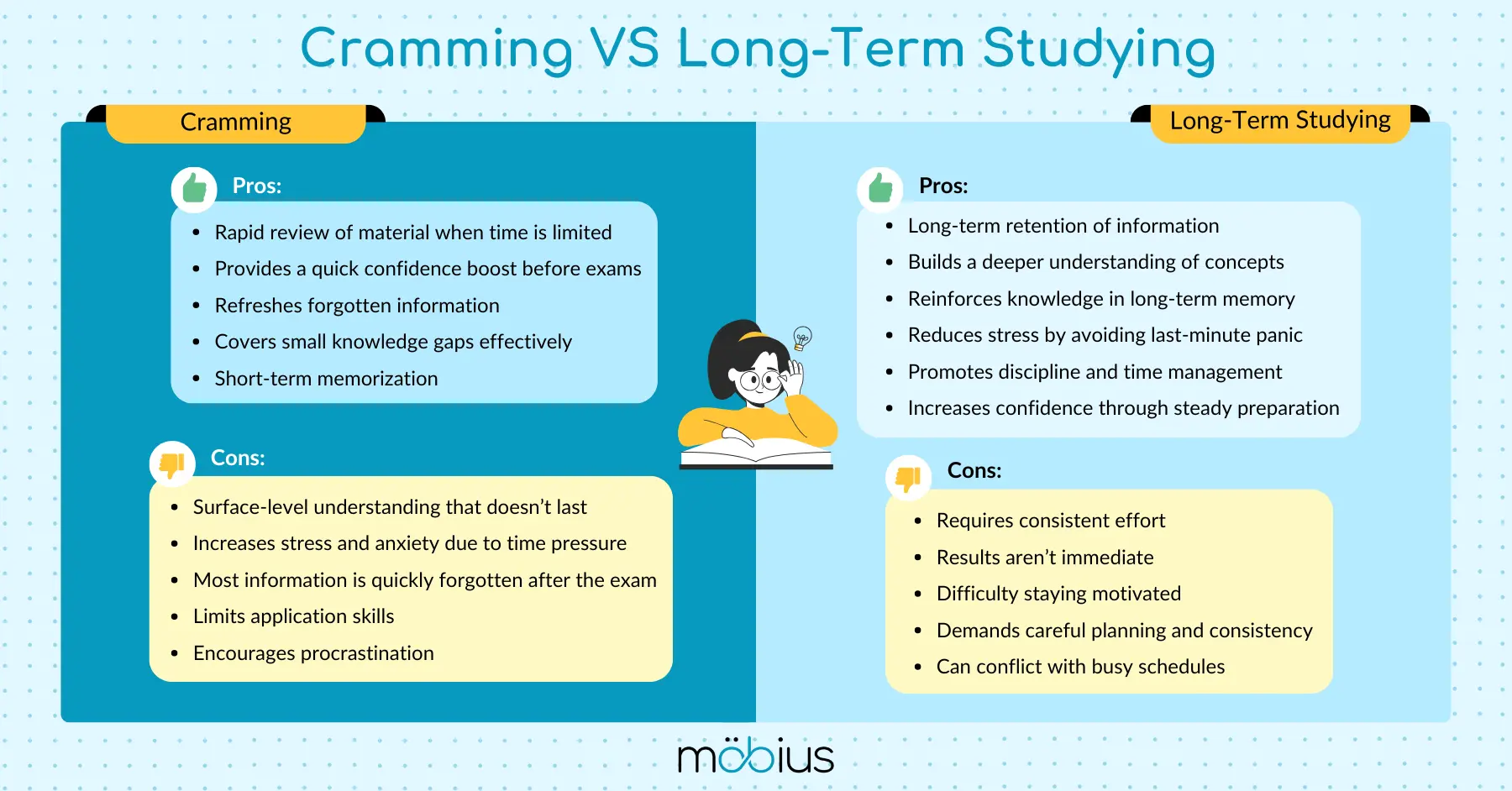
It’s a common occurrence—students burning the midnight oil, textbooks piled high, desperately trying to cram in as much information as possible before a big exam. While many students realize that cramming isn’t the most effective way to learn, the habit continues. According to research by the American Psychological Association (APA), students know cramming is less effective but lean on it due to time constraints and procrastination.
So, how do we shift the mindset and create new habits that help students retain information? In this blog, we’ll examine the differences between cramming and long-term studying, and introduce a third option: using online learning platforms to provide interactive lessons and unlimited practice opportunities that reinforces the information they are being taught. Let’s dive in!
The Realities of Cramming
Cramming is a common go-to for students trying to quickly absorb large amounts of material. While it may seem effective for last-minute preparation, the downsides often outweigh the benefits. Here are several key advantages and disadvantages:
Pros:
- Rapid review of material when time is limited
- Provides a quick confidence boost before exams
- Refreshes forgotten information
- Covers small knowledge gaps effectively
- Short-term memorization
Cons:
- Surface-level understanding that doesn’t last
- Increases stress and anxiety due to time pressure
- Most information is quickly forgotten after the exam
- Limits application skills
- Encourages procrastination
Educators often see the aftermath of cramming: students who may pass a test but fail to retain critical concepts over time. This can create challenges for instructors who want to build on prior knowledge in future lessons.
Why Long-Term Studying Works
In contrast, long-term studying focuses on building knowledge over time through proven techniques like spaced repetition, active recall, and concept mapping.
- Spaced repetition strengthens memory retention by reviewing material at carefully spaced intervals.
- Active recall challenges students to retrieve information from memory rather than passively reviewing it, reinforcing their understanding.
- Concept mapping visually organizes relationships between ideas, helping students connect and retain complex topics.
By incorporating these processes, long-term studying allows students to engage deeply with material, leading to better application of knowledge in the long run.
Pros:
- Long-term retention of information
- Builds a deeper understanding of concepts
- Reinforces knowledge in long-term memory
- Reduces stress by avoiding last-minute panic
- Promotes discipline and time management
- Increases confidence through steady preparation
Cons:
- Requires consistent effort
- Results aren’t immediate
- Difficulty staying motivated
- Demands careful planning and consistency
- Can conflict with busy schedules
While long-term studying is undeniably effective, instructors often struggle with finding ways to encourage students to adopt this approach, especially when faced with tight schedules and competing priorities.
A Third Way: Leveraging Online Learning Platforms
This is where technology can help. Online learning platforms, such as Möbius, provide a bridge between the intensity of cramming and the consistency of long-term studying. These tools allow students to:
- Practice at their own pace with unlimited exercises.
- Receive instant feedback, helping them learn from their mistakes.
- Access interactive lessons and assignments that engage them more actively.
For educators, these platforms reduce the burden of manual grading and allow for more personalized support. They can also help track student progress and identify areas where additional guidance is needed.
A quick review of cramming and long-term studying:

Möbius: A Practical Solution
Möbius offers a comprehensive solution for higher education instructors. With features like adaptive assignments, randomized assessments, and detailed analytics, Möbius helps both students and teachers achieve their goals. By integrating seamlessly into existing learning management systems (LMS), it provides instructors with additional tools to make learning approachable and effective.
Encourage your students to practice smarter, not harder. Möbius gives them the confidence to master concepts over time while reducing the pressure of last-minute studying. By combining the strengths of long-term studying with the flexibility and innovation of online learning platforms like Möbius, instructors can create an environment where students thrive.
Ready to explore how Möbius can enhance your teaching approach?
Learn more and book a demo today!

